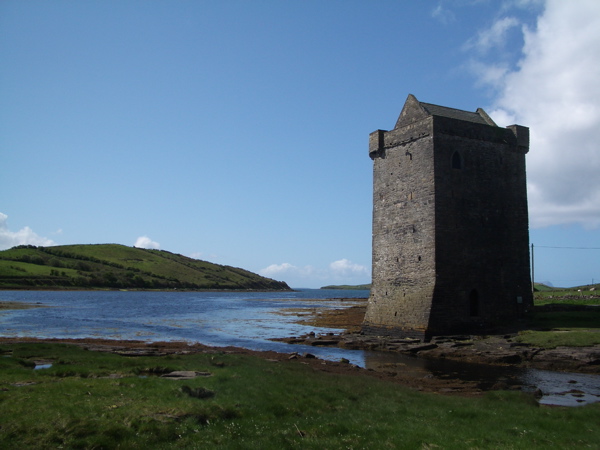
Mid-16th century tower house on an inlet from Clew Bay near Rockfleet Castle (Carrick-a-Howley/Carraig-an-Cabhlaigh), one of Grace O’Malley’s strongholds. (Source: Wikicommons)
‘She had strongholds on her headlands
And brave galleys on the sea
And no warlike chief or Viking
E’er had bolder heart than she.'[ref]1. Taken from verse 4 of the song Granuaile published by J Hardiman, Irish Minstrelsy, vol. II and reproduced in Ann Chambers, ‘Granuaille: The Life and Times of Grace O’Malley’ (Dublin, 1979), Appendix 1, pp.189-193.[/ref]
There are many surprising finds when one peers into the intriguing annals of piracy – none more so than the life of Grace O’Malley (Gráinne Ní Mhaille).
Born in 1530 to an Irish chieftain of the O’Malley’s of Murrisk, situated in a remote north-western corner of County Mayo, she forged a career in seafaring and piracy spanning over 40 years. Aside from this she was frequently active in regional politics and in native opposition in Connaught to encroaching English rule.
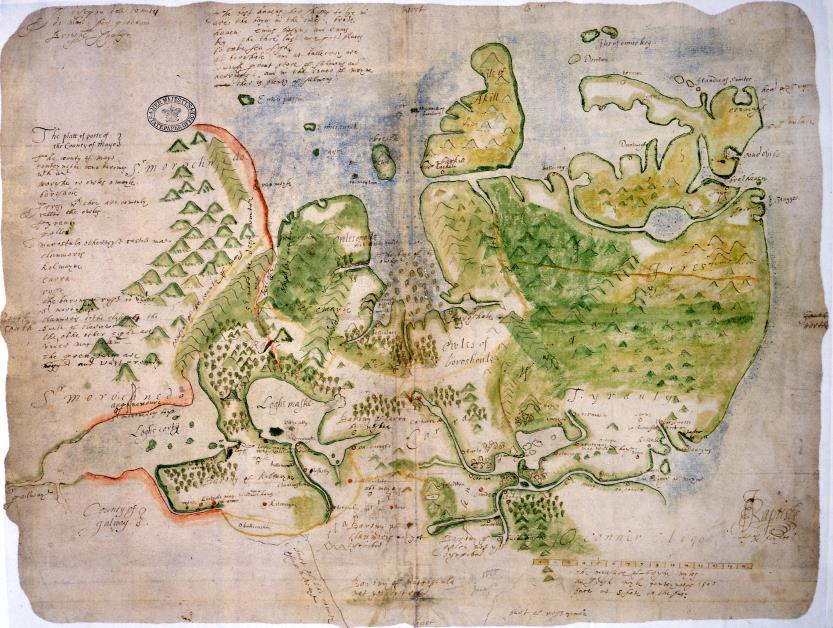
Map of County Mayo, 1585. The small island north of Clew bay in the centre of the map is Clare Island, where the O’Malley clan had their summer residence and which Grace used as a stronghold. The territory of the O’Malleys (‘Umhalls Ui Mhaille’) is marked on the left-hand edge of the bay: ‘owles omaile’ (catalogue reference: MPF 1/92)
Her remarkable life and career have not only been celebrated in numerous poems down the centuries, but also preserved for posterity in a surprising place: the official records of State Papers of the English crown. She features in the correspondence by English officials and also in records relating to her petitions and audience with Queen Elizabeth I.
In tribute to this remarkable woman, the details of her story revealed in these records should be shared.
Grace belonged to the O’Malley clan, who boasted a long tradition of seamanship. She would have been taught the art of seafaring, and been familiar with the seas around her home from childhood. Her marriages to powerful local clan strongmen Donal O’Flaherty and later Richard Burke would furnish her with the means she needed to embark on an extraordinary career.
From her strongholds on Clare Island and Carrickahowley (Rockfleet) in Clew bay, Grace would command her galleys to intercept ships travelling across the mouth of the bay, extorting levies for safe passage or plundering those foolish enough not to comply. Grace would also sail further afield either on peaceful trade missions or commanding raids against English and Irish enemies.
Many fables celebrating her courage and prowess have been captured in verse and song. For instance, the day after her son Theobald (known as Theobald of the Ships) was born on a return voyage from a trading mission in 1567, a Turkish corsair is said to have attacked their ship. In the midst of the battle she is said to have roused the courage of her men by firing a blunderbuss at the Turkish assailants and crying ‘take this load from unconsecrated hands!’ [ref]2 Ordinance Survey of Mayo, Vol 1, p. 1 quoted in Ann Chambers, Granuaille: The Life and Times of Grace O’Malley (Dublin, 1979).[/ref]
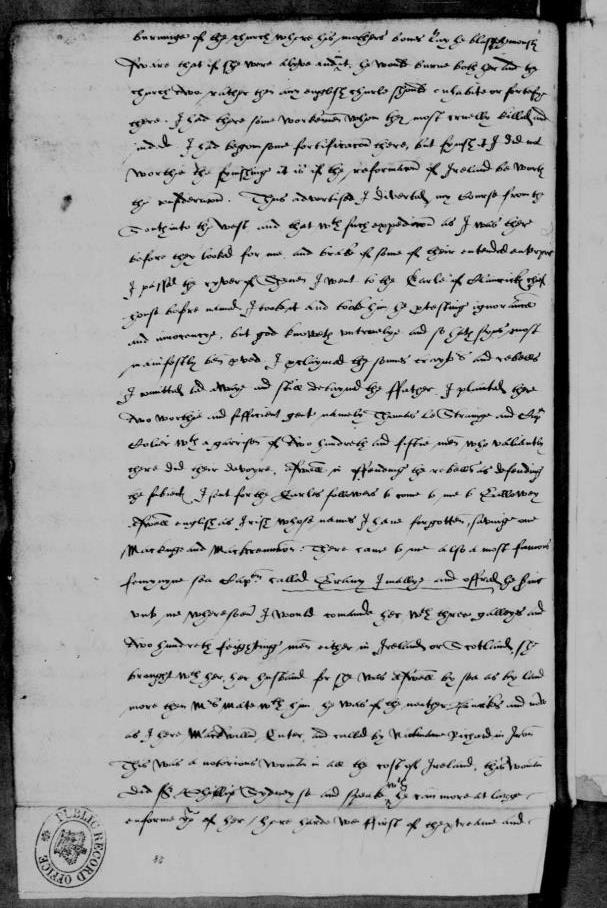
Sir Henry Sydney’s account to Walsingham of his conduct as Lord Deputy of Ireland; he recalls the meeting with Grace, and her name is underlined (catalogue reference: SP 12/159 f.27d)
Despite her general opposition to the English interference in the region, the fluidity of inter-clan politics meant that she offered the services of her galleys and men to the English crown in 1577. The Lord Deputy of Ireland, Sir Henry Sidney, reflects on this in a letter to the queen’s secretary Sir Francis Walsingham, six years later in 1583:
‘There came to me also a famous feminine sea captain called Grany Imallye and offered her services unto me, wheresoever I would command her with three galleys and 200 fighting men either to Scotland or Ireland….this was a notorious woman in all the coasts of Ireland.’
However Grace’s circumstances were to become increasingly difficult as the English administration tightened its hold on the Connaught region. At the hand of the ruthless new governor of Connaught, Sir Richard Bingham (appointed in 1584), Grace was deprived of much of her income as her cattle were confiscated and her ships seized.
Grace’s circumstances had become so desperate by 1593 that the pirate queen decided to dispatch a petition to Queen Elizabeth I, asking her for relief from a state of near poverty and for permission to attack ‘the Queen’s enemies’ for her maintenance. Her petition, although a plea for help, disguised an attempt to circumvent Bingham’s authority through favour with his sovereign.
In any case she received a reply to her entreaty which is perhaps the most interesting record produced from the administrative records of the English crown. The Queen sent Grace a set of 18 interrogatories (questions) to determine her family background, connections and the circumstances of her maintenance during her lifetime.
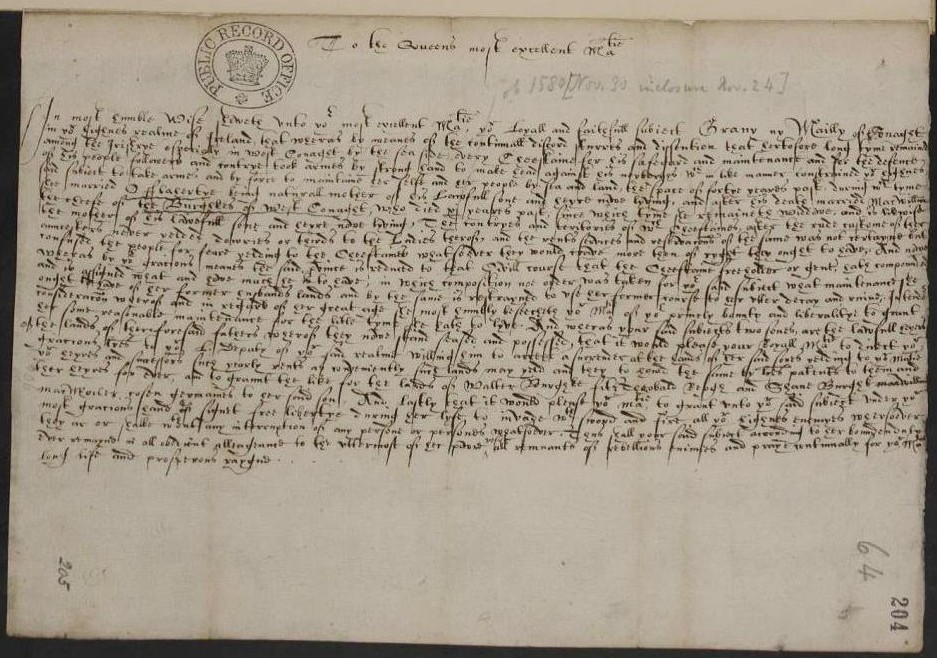
Grace’s petition requesting that the queen help settle her rights to sufficient maintenance, July 1593 (Catalogue reference: SP 63/170 f. 204)
Her answers reveal various details of her personal life including her marriages, family issues and personal circumstances. It gave Grace the opportunity to present her version of events as a victim of poverty and persecution with the intention that her words would induce Elizabeth’s sympathy. She did this with some skill, implying her actions of piracy were her only means of survival and the treatment she received at the hands of the overzealous Bingham callous and unjust.
- First page of the 18 interrogatories to be answered by Grace O’Malley (catalogue reference: SP 63/170 f. 201)
- A page giving Grace’s answers to four questions, with notes in the margin written by the queen’s secretary Sir Walter Burghley (catalogue reference: SP 63/170 f. 202)
In answer to one question she describes the ordeal of her arrest in 1586 at Bingham’s hand. She says he ’caused a new pair of gallows to be made for her last funerall wher shy thought to end her daies’ and only the intervention of her son in law Richard Burke saved her.
Her resolve to pursue justice for herself, spurred by the imprisonment of her son Theobald, led her to travel to London to seek audience with the queen.

Perspective of the River Thames by Jonas More, 1662. Grace would have probably witnessed a similar view of London in 1593 when seeking audience with Queen Elizabeth (catalogue reference: WORK 38/331)
The encounter between Elizabeth and Grace O’Malley at Greenwich castle in September 1593 was a significant one as the first female sovereign of the ‘sceptred Isle’ met with the unconventional ‘pirate queen’ of the Irish seas.
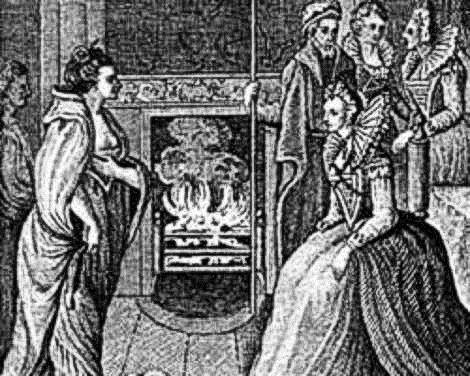
Meeting between Grace O’Malley and Queen Elizabeth I at Greenwich Castle, September 1593. Illustration from Anthologia Hibernica, vol. 11, 1793. (Source: Wikicommons)
Grace must have made a strong impression on Elizabeth: she subsequently granted Grace her requests on condition that she cease all rebellious activity against the crown.
Sadly Grace’s triumph in London was short-lived and although her son Theobald was reluctantly released, Bingham sought to undermine the terms of her recent agreement with Elizabeth. Two further petitions were sent by Grace to the Queen’s secretary in April and May of 1595 again beseeching support for the relief of her unjust impoverishment but no response is recorded (SP 63/179, ff. 75-76 and 77-78). Elizabeth was by this time preoccupied with the more urgent matter of quelling a major rebellion led by Hugh O’Neil, Earl of Tyrone.
The rebellion only served to impoverish Grace further, as county Mayo suffered devastation during the uprising. Her fleet was able to put to sea once again unchallenged, but Grace was in the twilight of her life and could no longer sail and rove the seas as she once did. She died sometime in 1603.
Her life had been forged and shaped by the sea and the wild shores of western Mayo and her life reflected a fierce devotion to independence as queen of the sea, queen of her clan, queen of Mayo. In the words of the final lines of Sir Samuel Ferguson’s poem, Grace O’Malley:
‘Such was the life the lady chose
Such choosing, we commend her.'[ref]3. Taken from final verse of the poem Grace O’Malley by Sir Samuel Ferguson reproduced in Ann Chambers, Granuaille: The Life and Times of Grace O’Malley (Dublin, 1979), Appendix 1, pp.184-188.[/ref]
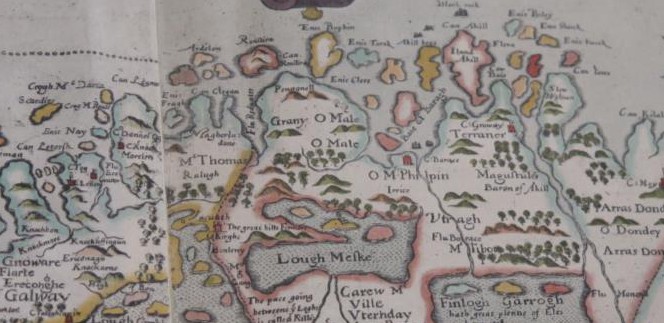
Her name ‘Grany O Male’ lies over the territory top centre of the west coast of county Mayo and parts of Galway (catalogue reference: ZMAP 5/26)
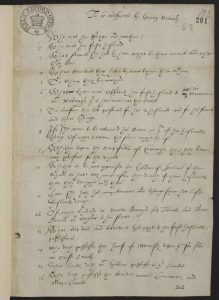
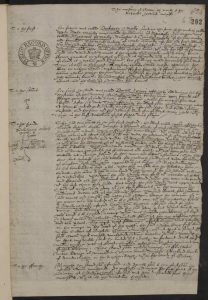
I was fascinated to read this. Last year I took part in the UK premiere of Boublil & Schonberg’s musical ‘The Pirate Queen’ based on the life of Grace O’Malley. Researching Grace for the publicity, I was astonished to find out how much of the romanticised musical story was actually true. She certainly deserves to have her place recognised in Irish/Briish history.
Dear Elizabeth,
Thank you very much for your comment. I’m pleased you enjoyed the blog! Yes I agree that Grace O’Malley does deserve recognition in both Irish and British history as the life she led was an extraordinary one, very counter cultural and at times revolutionary. She was a strong character and leader, a pirate and also a defender of the independence of her own clan from encroachment by English or rival Irish clans. For this reason I hoped the blog would shed light on her character and life through the records held at the National Archives.
Thanks again for reading and commenting on the blog!
Thank you for the information. I teach English to GCSE students in France and we currently study ‘Myths and heroes’, analyzing why pirates still fascinate people today. The website was useful to me because I found some information to understand some videos better and also because I had the opportunity of seeing the castle near Clew Bay ( but found very little information in the vicinity of the castle !).
Anne
Dear Anne,
Thank you for leaving your comments. I am pleased that the information on the blog was helpful for the subject of Myth’s and Heroes you are currently teaching to your students. I would love to visit Clew Bay and the castle on Clare Island myself. Certainly having visited you can see why it was ideal terrain for Grace O’Malley to intercept merchant vessels with her own ships concealed around inlets within the bay.
Thanks again for reading and commenting on the blog!
Does anybody know about a movie production wich is planed – they want to make a film about Grace ?
I´ve heard that there are plans to do this, but I don´t know anything clear like where and what kind of producer (production company), when it should start (the working on the movie) …
Thanks in advance for any information 🙂
Laura
There was a post about it at least 4 years ago that a movie was in production but they had not finished it yet ! ? it said it was also to be released in Europe and in the United states this was stated in book advertisement om Amazon books. Mary
Dear Laura
Thank you for your comment.
Yes a film about Grace O’Malley entitled Grainne Uaile is due for release (in the USA) on 9th January 2017 and is being produced by Loose Grip Films. More information can be found on the movie at the following website: http://www.imdb.com/title/tt2766800/
I hope this is helpful.
Thanks for reading and commenting on the blog!
Is there any update on this film? It has not been released in the U.S. as of Aug. 1, 2017.
Hello Benjamin,
This is a terrific article about Grace. Of course we who write about her are all constrained by the paucity of factual evidence (where would we be without Anne Chambers’ book and the State Papers?). Just wanted to let your last commenter know that a cable TV series is planned. Just yesterday in the London Sunday Times (Irish Edition) this article was published about “All the Queens’ Men” (yes, the apostrophe is in the right place!), about the project, based on two of my novels, THE WILD IRISH and THE QUEEN’S BASTARD.
Slainte,
Robin Maxwell
http://www.thetimes.co.uk/article/1e070f42-eb10-11e6-aeca-a0919298400f
Dear Robin,
Thank you for your comment on this blog.
I’m pleased you enjoyed reading it and I was interested to read the Times article via the link you sent on the upcoming series on Grace based on your novels on her.
Grace is a fascinating and inspirational but largely unknown historical and legendary figure outside of Ireland. It is great therefore to see growing interest in Grace and portraying different facets of her life on the screen as well as in literature.
Thanks again for reading the blog!
Benjamin
I am emailing from Galway City Museum where we are hoping to undertake some work on Grace’s story and I have just come across your blog. Would you have a direct email I could contact you on?
Best wishes
Helen
[…] Clayton, The Dahomey Amazons, Brunhild of the Valkyries, Nakano Takeko, the Briton Queen Boudica, Grace O’Malley, and basically this list […]
My name is Emma Nelson. I am doing a research project on Grace O’Malley in which we are required to have an expert. I was wondering if maybe you could answer some of my questions.
1. Why do you think O’Malley was so good at wording her responses
2. How close was O’Malley’s relationships with her children
3. Why did the queen agree to meet with a pirate of all people and invite her to her home of all places
4. How difficult to you believe it was for the queen to trust O’Malley, a well known pirate, with anything at all.
If you are unable to answer these questions, I understand.
Thank You, -Emma Nelson
Hi Emma,
Unfortunately we can’t help with research requests on the blog. if you’d like to get in touch with our records experts, please go to the ‘contact us’ page on our website: https://www.nationalarchives.gov.uk/contact-us/
You’ll see how to get in touch with our experts by phone, email or live chat.
Best regards,
Liz.
This is good website and it gives good information about grace o’malley.
Wonderful web page – – thanks for doing it. Isn`t it the old story that women were written out of history – Grace is a typical example. Written out because history was (is ?) written predominantly by men and if they happened to be English men who were run ragged by Grace time and time again Well we suffer because much accurate detail about Grace has been lost. I think I was more a man v female issue rather than an Irish v English thing.
Thank you for this wonderful information! Would you know of a website or museum that might have the genealogy of Grace O’Malley? My family is said to be direct descendants but I’d love to have proof of that. Thank you!
Dear Ms Lange,
Thank you for reading and commenting positively on the blog.
There is a visitor centre dedicated to telling Grace’s story based in Louisburgh, County Mayo, Ireland and she features notably amongst the displays at Westport House, County Mayo, which was until recently the seat of the Browne family whose head was the Marquess of Sligo and whose family are direct descendants of Grace. Several genealogical websites where individuals have posted information on possible ancestral links might be found through Google searching but there is no website that at least I’m aware of dedicated to documenting Grace’s family tree and descendants.
Thanks again for your comment.
Benjamin Trowbridge
Benjamin
Are all the documents in the national archives or are they in different archives? I am looking to get copies of them for a piece in our display of empowered women at Croome Court, as there is a link between Grace and Maria Gunning wife of the 6th earl of Coventry.
Dear Nicola,
Thank you for your comment on the Grace O’Malley blog.
The majority of surviving administrative records that refer to Grace O’Malley can be found within our record holdings, many being found in the State Paper records for Ireland (SP 63). Some of the more notable examples feature in the above blog.
Isolated references may be found in other institutions in the Public Record Office of Ireland in Dublin.
We also do not however hold any literary material such as ballads, songs or poems written about Grace, from which excerpts have been quoted in the blog.
For additional information and reference to source material I would recommend Anne Chambers’ book Granuaile: The Life and Times of Grace O’Malley.
Thanks again for your comment.
Benjamin Trowbridge
Hello all,
I spent a warm sunny week last July on Clare Island. There is a little museum there with Grace’s letters to her sons and Queen Elizabeth I, her weapons and a lot of other memorabilia. We swam in the beautiful cove beside her castle every morning, explored the mountains, lighthouse, organic farms and yoga retreat by day. Enjoyed fresh lobster crab, mussels and gin by night! And then danced it all away in either the bar or Community centre. Highly recommended for every age!
Dear Amanda,
Sounds like you had an amazing trip all round in a place that was central in Grace’s own story! Thank you for leaving your comment on this blog!
Kind regards
Benjamin Trowbridge
[…] A map drawn in 1585 of County Mayo, which shows the O’Malleys’ territory. Original image and additional information found here. […]
[…] The first page of the interrogatories Queen Elizabeth I sent to Grace O’Malley. SOURCE: http://blog.nationalarchives.gov.uk/blog/meeting-grace-omalley-irelands-pirate-queen/. […]
its good i like it……….. and yeaaaaaaaaaaaaaaaaaa
Gráinne Ní Mhaille is this year’s person of interest at the New Jersey Renaissance Fair!!! It’s a fascinating tale
Thank you so much for this wonderful information! I have been told I am a direct descendant of Grace, being of the O’Malley clan on my grandmother’s linage.
I am just starting to dig into all of the records so this has been an incredible link.
I thank my dear friend and mentor Prof Stephen Heppell for posting it to me.
Cheers and thank you!
Paula Jane Stafford Kelly Paull
Nee Stafford daughter of Janice Gutteridge daughter of Doreen O’Malley.
Do you think a different author could have written about Grace O’Malley’s life but have made a very different claim? How so? How might the point of view of the author impacted the claim we take away as readers? *
Excellent article, Here is a short history of Hen’s Island, Grace’s castle fortress in the north of Lough Corrib.
Note: Im unable to acknowledge the photographer of this amazing image.
https://www.facebook.com/photo?fbid=1283980985291184&set=a.207707849585175
Very informative but there seems to be some confusion with the nationality of the ships crew that attacked Grace and her crew after she gave birth to Tiobald.
Algerian or Turkish depending on which account you read.
Either way she was a formidable woman.
What an incredible life!
I would love for an accurate film to be made of this amazing woman’s life (and not downgraded into unnecessary intimate sex scenes, as so many famous womens’ lives are in film these days)
We should celebrate her life, her indomitable strong character and her intellectual abilities. ?
Delighted to read this blog. I live near Greenwich. It would be wonderful to see this meeting of Queens commentated in Greenwich.